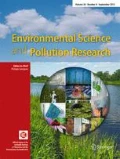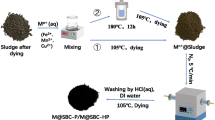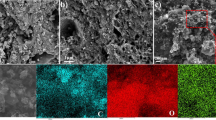Abstract
Sunflower stalk–derived biochars (BC) were prepared at various temperatures (i.e., 500, 650, and 1000 °C) and demonstrated as a highly efficient catalyst in persulfate (PS) activation for the oxidation of p-nitrophenol (PNP) at 60 °C. The apparent PNP oxidation rate constant in the BC500 (0.1543 L mol−1 S−1), BC650 (0.6062 L mol−1 S−1), or BC1000 (2.1379 L mol−1 S−1) containing PS system was about 2, 8 and 28 times higher than that in PS/PNP (0.0751 L mol−1 S−1) system, respectively. The effect of reaction temperature on PNP oxidation was also investigated. Furthermore, the radical quenching tests and electron paramagnetic resonance spectroscopy (EPR) were employed to investigate the sulfate and hydroxyl radicals for PNP oxidation. The Raman results suggested that the defective sites on biochars possess vital role for oxidation of PNP in PS system. The possible activation pathway of PS/BC was proposed that the defective sites on BC were involved for weakening the O–O bond in PS and subsequently cleaving O–O bond by heat to generate sulfate radical. The oxidation of PNP at low concentration (below 100 μg L−1) was completely removed in urban wastewater by PS/BC system within 30 min. This work would provide new insights into PS activation by BC catalyst and afford a promising method for organic pollutant removal in high-temperature wastewater.







Similar content being viewed by others
References
Ahmad M, Lee SS, Dou X, Mohan D, Sung J-K, Yang J-E, Ok YS (2012) Effects of pyrolysis temperature on soybean stover- and peanut shell-derived biochar properties and TCE adsorption in water. Bioresour Technol 118:536–544. https://doi.org/10.1016/j.biortech.2012.05.042
Andrew JH, Peter V, Jonathan W, Luca A, Carlos C, Gabriela D, Elise C, Pablo C (2018) Impacts of coagulation-flocculation treatment on the size distribution and bioavailability of trace metals (Cu, Pb, Ni, Zn) in municipal wastewater. Water Res 128:120–128. https://doi.org/10.1016/j.watres.2017.10.050
Bilal M, Iqbal HMN, Hu H-B, Wang W, Zhang X-H (2017) Enhanced bio-catalytic performance and dye degradation potential of chitosan-encapsulated horseradish peroxidase in a packed bed reactor system. Sci Total Environ 575:1352–1360. https://doi.org/10.1016/j.scitotenv.2016.09.215
Burhenne L, Damiani M, Aicher T (2013) Effect of feedstock water content and pyrolysis temperature on the structure and reactivity of spruce wood char produced in fixed bed pyrolysis. Fuel 107:836–847. https://doi.org/10.1016/j.fuel.2013.01.033
Cha J-S, Park SH, Jung S-C, Ryu C, Jeon J-K, Shin M-C, Park Y-K (2016) Production and utilization of biochar: a review. J Ind Eng Chem 40:1–15. https://doi.org/10.1016/j.jiec.2016.06.002
Chen Y, Yang S, Wang K, Lou L (2005) Role of primary active species and TiO2 surface characteristic in UV-illuminated photodegradation of Acid Orange 7. J Photochem Photobiol A 172(1):47–54. https://doi.org/10.1016/j.jphotochem.2004.11.006
Chen Z, Xiao X, Chen B, Zhu L (2015) Quantification of chemical states, dissociation constants and contents of oxygen-containing groups on the surface of biochars produced at different temperatures. Environ Sci Technol 49(1):309–317. https://doi.org/10.1021/es5043468
Chen J-B, Hong W, Huang T-Y, Zhang L-M, Li W-W, Wang Y (2016a) Activated carbon fiber for heterogeneous activation of persulfate: implication for the decolorization of azo dye. Environ Sci Pollut Res 23:18564–18574. https://doi.org/10.1007/s11356-016-7015-4
Chen J-B, Zhang L-M, Huang T-Y, Li W-W, Wang Y, Wang Z-M (2016b) Decolorization of azo dye by peroxymonosulfate activated by carbon nanotube: radical versus non-radical mechanism. JHM 320:571–580. https://doi.org/10.1016/j.jhazmat.2016.07.038
Chen X, Murugananthan M, Zhang Y (2016c) Degradation of p-nitrophenol by thermally activated persulfate in soil system. Chem Eng J 283:1357–1365. https://doi.org/10.1016/j.cej.2015.08.107
Chen Y-Q, Deng P-Y, Xie P-C, Shang R, Wang Z-P, Wang S-L (2017) Heat-activated persulfate oxidation of methyl- and ethyl-parabens: effect, kinetics, and mechanism. Chemosphere 168:1628–1636. https://doi.org/10.1016/j.chemosphere.2016.11.143
Chun Y, Sheng G-Y, Chiou C-T, Xing B-S (2004) Compositions and sorptive properties of crop residue-derived chars. Environ Sci Technol 38:4649–4655. https://doi.org/10.1021/es035034w
Duan X, Ao Z, Zhou L, Sun H, Wang G, Wang S (2016a) Occurrence of radical and nonradical pathways from carbocatalysts for aqueous and nonaqueous catalytic oxidation. Appl Catal B 188:98–105. https://doi.org/10.1016/j.apcatb.2016.01.059
Duan X, Sun H, Ao Z, Zhou L, Wang G, Wang S (2016b) Unveiling the active sites of graphene-catalyzed peroxymonosulfate activation. Carbon 107:371–378. https://doi.org/10.1016/j.carbon.2016.06.016
Eduard R, Ralf M, Ulusoy B, Heidrun S (2017) Removal of phosphonates from industrial wastewater with UV/FeII, Fenton and UV/Fenton treatment. Water Res 122:345–354. https://doi.org/10.1016/j.watres.2017.06.009
Fang G, Gao J, Liu C, Dionysiou DD, Wang Y, Zhou D (2014) Key role of persistent free radicals in hydrogen peroxide activation by biochar: implications to organic contaminant degradation. Environ Sci Technol 48(3):1902–1910. https://doi.org/10.1021/es4048126
Giovanni C, John R, Huang J, Zhang K-L, Yu G (2016) Mechanochemical destruction of halogenated organic pollutants: a critical review. J Hazard Mater 313:85–102. https://doi.org/10.1016/j.jhazmat.2016.03.076
Graca CAL, Fugita LTN, Velosa AC (2018) Amicarbazone degradation promoted by ZVI-activated persulfate: study of relevant variables for practical application. Environ Sci Pollut Res 25:5474–5483. https://doi.org/10.1007/s11356-017-0862-9
Guizani C, Haddad K, Limousy L, Jeguirim M (2017) New insights on the structural evolution of biomass char upon pyrolysis as revealed by the Raman spectroscopy and elemental analysis. Carbon 119:519–521. https://doi.org/10.1016/j.carbon.2017.04.078
Haidar M, Dirany A, Sires I, Oturan N, Oturan MA (2013) Electrochemical degradation of the antibiotic sulfachloropyridazine by hydroxyl radicals generated at a BDD anode. Chemosphere 91:1304–1309. https://doi.org/10.1016/j.chemosphere.2013.02.058
Hou X-J, Huang X-P, Jia F-L, Ai Z-H, Zhao J-C, Zhang L-Z (2017) Hydroxylamine promoted goethite surface Fenton degradation of organic pollutants. Environ Sci Technol 51:5118–5126. https://doi.org/10.1021/acs.est.6b05906
Hu P-D, Su H-R, Chen Z-Y, Yu C-Y, Li Q-L, Zhou B-X, Alvarez PJJ, Long M-C (2017) Selective degradation of organic pollutants using an efficient metal-free catalyst derived from carbonized polypyrrole via peroxymonosulfate activation. Environ Sci Technol 51:11288–11296. https://doi.org/10.1021/acs.est.7b03014
Huang K-C, Zhao Z-Q, Hoag G-E, Dahmani A, Block PA (2005) Degradation of volatile organic compounds with thermally activated persulfate oxidation. Chemosphere 61:551–560. https://doi.org/10.1016/j.chemosphere.2005.02.032
Huang Y, Candelaria SL, Li Y, Li Z, Tian J, Zhang L, Cao G (2014) Sulfurized activated carbon for high energy density supercapacitors. J Power Sources 252:90–97. https://doi.org/10.1016/j.jpowsour.2013.12.004
Huang T-Y, Chen J-B, Wang Z-M, Guo X, Crittenden J-C (2017) Excellent performance of cobalt-impregnated activated carbon in peroxymonosulfate activation for acid orange 7 oxidation. Environ Sci Pollut Res 24:9651–9661. https://doi.org/10.1007/s11356-017-8648-7
Ji Y-F, Dong C-X, Kong D-Y, Lu J-H, Zhou Q-S (2015a) Heat-activated persulfate oxidation of atrazine: implications for remediation of groundwater contaminated by herbicides. Chem Eng J 263:45–54. https://doi.org/10.1016/j.cej.2014.10.097
Ji Y-F, Fan Y, Liu K, Kong D-Y, Lu J-H (2015b) Thermo activated persulfate oxidation of antibiotic sulfamethoxazole and structurally related compounds. Water Res 87:1–9. https://doi.org/10.1016/j.watres.2015.09.005
Jiang D-E, Sumpter B-G, Dai S (2007) Unique chemical reactivity of a graphene nanoribbon’s zigzag edge. J Phys Chem 126(13):134701. https://doi.org/10.1063/1.2715558
Kitano M, Arai K, Kodama A, Kousaka T, Nakajima K, Hayashi S, Hara M (2009) Preparation of a sulfonated porous carbon catalyst with high specific surface area. Catal Lett 131(1-2):242–249. https://doi.org/10.1007/s10562-009-0062-4
Kong X-J, Jiang J, Ma J, Yang Y, Liu W-L, Liu Y-L (2016) Degradation of atrazine by UV/chlorine: efficiency, influencing factors, and products. Water Res 90:15–23. https://doi.org/10.1016/j.watres.2015.11.068
Kostov MK, Santiso EE, George AM, Gubbins KE, Nardelli MB (2005) Dissociation of water on defective carbon substrates. Phys Rev Lett 95:136105. https://doi.org/10.1103/PhysRevLett.95.136105
Lee G, Cho K (2009) Electronic structures of zigzag graphene nanoribbons with edge hydrogenation and oxidation. Phys Rev B 79:115409. https://doi.org/10.1103/PhysRevB.79.165440
Lee YC, Lo SL, Kuo J, Huang C-P (2013) Promoted degradation of perfluorooctanic acid by persulfate when adding activated carbon. J Hazard Mater 261:463–469. https://doi.org/10.1016/j.jhazmat.2013.07.054
Lee H, Lee H-J, Jeong J, Lee J, Park N-B, Lee C (2015) Activation of persulfates by carbon nanotubes: oxidation of organic compounds by nonradical mechanism. Chem Eng J 266:28–33. https://doi.org/10.1016/j.cej.2014.12.065
Lee H, Kim H, Weon S, Choi W, Hwang YS, Seo J, Lee C, Kim J (2016) Activation of persulfates by graphitized nanodiamonds for removal of organic compounds. Environ Sci Technol 50:10134–10142. https://doi.org/10.1021/acs.est.6b02079
Liang C, Su H-W (2009) Identification of sulfate and hydroxyl radicals in thermally activated persulfate. Ind Eng Chem Res 48:5558–5562. https://doi.org/10.1021/ie9002848
Liang C, Huang C-F, Mohanty N, Kurakalva RM (2008) A rapid spectrophotometric determination of persulfate anion in ISCO. Chemosphere 73(9):1540–1543. https://doi.org/10.1016/j.chemosphere.2008.08.043
Liu L, Fan S-S (2018) Removal of cadmium in aqueous solution using wheat straw biochar: effect of minerals and mechanism. Environ Sci Pollut Res 25:8688–8700. https://doi.org/10.1007/s11356-017-1189-2
Liu X-Q, Ding H-S, Wang Y-Y, Liu W-J, Jiang H (2016) Pyrolytic temperature dependent and ash catalyzed formation of sludge char with ultra-high adsorption to 1-Naphthol. Environ Sci Technol 50(5):2602–2609. https://doi.org/10.1021/acs.est.5b04536
Ouyang W, Zhao X, Tysklind M, Hao F, Wang F (2015) Optimisation of corn straw biochar treatment with catalytic pyrolysis in intensive agricultural area. Ecol Eng 84:278–286. https://doi.org/10.1016/j.ecoleng.2015.09.003
Pan X, Yan L, Qu R, Wang Z (2018) Degradation of the UV-filter benzophenone-3 in aqueous solution using persulfate activated by heat, metal ions and light. Chemosphere 196:95–104. https://doi.org/10.1016/j.chemosphere.2017.12.152
Su C, Acik M, Takai K, Lu J, Hao S-J, Zheng Y, Wu P, Bao Q, Enoki T, Chabal Y-J, Loh K-P (2012) Probing the catalytic activity of porous graphene oxide and the origin of this behaviour. Nat Commun 3:1298. https://doi.org/10.1038/ncomms2315
Sun S-P, Lemley A-T (2011) p-Nitrophenol degradation by a heterogeneous Fenton-like reaction on nano-magnetite: process optimization, kinetics, and degradation pathways. J Mol Catal A Chem 349(1-2):71–79. https://doi.org/10.1016/j.molcata.2011.08.022
Sun K, Kang M, Zhang Z, Jin J, Wang Z, Pan Z, Xu D, Wu F, Xing B (2013) Impact of deashing treatment on biochar structural properties and potential sorption mechanisms of phenanthrene. Environ Sci Technol 47(20):11473–11481. https://doi.org/10.1021/es4026744
Sun H, Kwan C, Suvorova A, Ang HM, Tadé MO, Wang S (2014) Catalytic oxidation of organic pollutants on pristine and surface nitrogen-modified carbon nanotubes with sulfate radicals. Appl Catal B 154-155:134–141. https://doi.org/10.1016/j.apcatb.2014.02.012
Tian W, Zhang H, Duan X, Sun H, Tade MO, Ang HM, Wang S (2016) Nitrogen- and sulfur-codoped hierarchically porous carbon for adsorptive and oxidative removal of pharmaceutical contaminants. ACS Appl Mater Interfaces 8(11):7184–7193. https://doi.org/10.1021/acsami.6b01748
Timmins GS, Liu K-J, Bechara EJH, Kotake Y, Swartz HM (1999) Trapping of free radicals with direct in vivo EPR detection: a comparison of 5,5-dimethyl-1-pyrroline-N-oxide and 5-diethoxyphosphoryl-5-methyl-1-pyrroline-N-oxide as spin traps for •OH and SO4 •−. Free Radic Biol Med 27:329–333. https://doi.org/10.1016/S0891-5849(99)00049-0
Vaquero S, Díaz R, Anderson M, Palma J, Marcilla R (2012) Insights into the influence of pore size distribution and surface functionalities in the behaviour of carbon supercapaci-tors. Electrochim Acta 86:241–247. https://doi.org/10.1016/j.electacta.2012.08.006
Wang S-Z, Wang J-L (2018) Trimethoprim degradation by Fenton and Fe(II)-activated persulfate processes. Chemosphere 191:97–105. https://doi.org/10.1016/j.chemosphere.2017.10.040
Wang X-B, Qin Y-L, Zhu L-H, Tang H-Q (2015) Nitrogen-doped reduced graphene oxide as a bifunctional material for removing bisphenols: synergistic effect between adsorption and catalysis. Environ Sci Technol 49:6855–6864. https://doi.org/10.1021/acs.est.5b01059
Yan J, Chen Y, Qian L, Gao W, Ouyang D, Chen M (2017) Heterogeneously catalyzed persulfate with a CuMgFe layered double hydroxide for the degradation of ethylbenzene. J Hazard Mater 338:372–380. https://doi.org/10.1016/j.jhazmat.2017.05.007
Yang E, Yao C, Liu Y, Zhang C, Jia L, Li D, Fu Z, Sun D, Robert KS, Yin D (2018) Bamboo-derived porous biochar for efficient adsorption removal of dibenzothiophene from model fuel. Fuel 211:121–129. https://doi.org/10.1016/j.fuel.2017.07.099
Zhang M, Chen X, Zhou H, Murugananthan M, Zhang Y (2015) Degradation of p-nitrophenol by heat and metal ions co-activated persulfate. Chem Eng J 264:39–47. https://doi.org/10.1016/j.cej.2014.11.060
Zhang C-S, Liu L, Zhao M-H, Rong H-W, Xu Y (2018a) The environmental characteristics and applications of biochar. Environ Sci Pollut Res 25:21525–21534. https://doi.org/10.1007/s11356-018-2521-1
Zhang K-J, Zhou X-Y, Zhang T-Q, Yu L, Qian Z-M, Liao W-C, Li C (2018b) Degradation of the earthy and musty odorant 2,4,6-tricholoroanisole by persulfate activated with iron of different valences. Environ Sci Pollut Res 25:3435–3445. https://doi.org/10.1007/s11356-017-0452-x
Zhang K-K, Sun P, Christine M, Zhang Y-R (2018c) Characterization of biochar derived from rice husks and its potential in chlorobenzene degradation. Carbon 130:730oo–730od. https://doi.org/10.1016/j.carbon.2018.01.036
Zhang X, Ma Y-H, Xi L-L, Zhu G-F, Li X, Shi D-Y, Fan J (2019) Highly efficient photocatalytic removal of multiple refractory organic pollutants by BiVO4/CH3COO(BiO) heterostructured nanocomposite. Sci Total Environ 647:245–254. https://doi.org/10.1016/j.scitotenv.2018.07.450
Zhou H, Zou X, Zhang K, Sun P, Islam MS, Gong J, Zhang Y, Yang J (2017) Molybdenum– tungsten mixed oxide deposited into titanium dioxide nanotube arrays for ultrahigh rate supercapacitors. ACS Appl Mater Interfaces 9:18699–18709. https://doi.org/10.1021/acsami.7b01871
Zhou R, Li T-T, Su Y, Ma T-G, Zhang L-J, Ren H-J (2018) Oxidative removal of metronidazole from aqueous solution by thermally activated persulfate process: kinetics and mechanisms. Environ Sci Pollut Res 25:2466–2475. https://doi.org/10.1007/s11356-017-0518-9
Zou J, Ma J, Chen L, Li X, Guan Y, Xie P, Pan C (2013) Rapid acceleration of ferrous iron/peroxymonosulfate oxidation of organic pollutants by promoting Fe(III)/Fe(II) cycle with hydroxylamine. Environ Sci Technol 47:11685–11691. https://doi.org/10.1021/es4019145
Zrinyi N, Pham AL (2017) Oxidation of benzoic acid by heat-activated persulfate: Effect of temperature on transformation pathway and product distribution. Water Res 120:43–51. https://doi.org/10.1016/j.watres.2017.04.066
Acknowledgments
The authors thank the Analytical and Testing Center of HUST for the use of Raman, EA, FTIR, XPS, and XRD equipments.
Funding
This work is financially supported by the International Science & Technology Cooperation Program of China (Nos. 2013DFG50150 and 2016YFE0126300) and the Innovative and Interdisciplinary Team at HUST (2015ZDTD027).
Author information
Authors and Affiliations
Corresponding author
Additional information
Responsible editor: Vítor Pais Vilar
Publisher’s note
Springer Nature remains neutral with regard to jurisdictional claims in published maps and institutional affiliations.
Electronic supplementary material
ESM 1
(DOCX 1506 kb)
Rights and permissions
About this article
Cite this article
Sun, P., Zhang, K., Gong, J. et al. Sunflower stalk–derived biochar enhanced thermal activation of persulfate for high efficient oxidation of p-nitrophenol. Environ Sci Pollut Res 26, 27482–27493 (2019). https://doi.org/10.1007/s11356-019-05881-w
Received:
Accepted:
Published:
Issue Date:
DOI: https://doi.org/10.1007/s11356-019-05881-w




